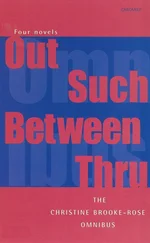Christine Brooke-Rose - Life, End of
Здесь есть возможность читать онлайн «Christine Brooke-Rose - Life, End of» весь текст электронной книги совершенно бесплатно (целиком полную версию без сокращений). В некоторых случаях можно слушать аудио, скачать через торрент в формате fb2 и присутствует краткое содержание. Год выпуска: 2012, ISBN: 2012, Издательство: Carcanet Press Ltd., Жанр: Современная проза, на английском языке. Описание произведения, (предисловие) а так же отзывы посетителей доступны на портале библиотеки ЛибКат.
- Название:Life, End of
- Автор:
- Издательство:Carcanet Press Ltd.
- Жанр:
- Год:2012
- ISBN:9781847775726
- Рейтинг книги:5 / 5. Голосов: 1
-
Избранное:Добавить в избранное
- Отзывы:
-
Ваша оценка:
- 100
- 1
- 2
- 3
- 4
- 5
Life, End of: краткое содержание, описание и аннотация
Предлагаем к чтению аннотацию, описание, краткое содержание или предисловие (зависит от того, что написал сам автор книги «Life, End of»). Если вы не нашли необходимую информацию о книге — напишите в комментариях, мы постараемся отыскать её.
by a master of experimental novels finds the author reflecting on her old age and its effects on her writing. As she reflects on her own career, her experiments with narrative, and on the narrative she writes here, she ultimately reasserts herself and accepts the life behind her.
Life, End of — читать онлайн бесплатно полную книгу (весь текст) целиком
Ниже представлен текст книги, разбитый по страницам. Система сохранения места последней прочитанной страницы, позволяет с удобством читать онлайн бесплатно книгу «Life, End of», без необходимости каждый раз заново искать на чём Вы остановились. Поставьте закладку, и сможете в любой момент перейти на страницу, на которой закончили чтение.
Интервал:
Закладка:
Compare streetnames on the continent: writers, scientists, politicians, all forgotten by the general public, if known at the time. Story: an ex-colonel, commanding British aid to French resistance, soon after the war gets a street in France named after him. He tells it himself. Wandering nearby he hears two ladies ask each other: Mais qui est-ce, ce Colonel Buckmaster? He steps in and bows: Mais Madame, c’est moi.
Valérie now comes in only at lunch time, preparing the supper tray and the breakfast tray on the magical wheeled table’s lower floor. That means orange juice for breakfast instead of the hot tea expected by the one kidney, since the left arm is incapable of lifting the kettle-jug of water. But that’s fine. Soon, one day, tea will again be possible, hip against the kitchen furniture and hands free of the zimmer.
The last two sections of the self-leering text are written in bed, as the first five in the armchair. But in both, the handwriting on the knee-board raised almost to a painter’s easel goes totally awry, illegible even to the writer, who in addition makes constant corrections, insertions, rewrites, transfers, omissions, until the Author’s Intention is not only long out of critical fashion but inaccessible even to the Author. The first four, each typed into the computer before the fall as soon as written in order to let memory help, are printed out, but after three weeks away from the computer, memory’s no help even when looking at the manuscript in bed, so that any effort at reading it sitting up in front of the computer, if it could be reached, would be trebled, bringing in the anginal lacerations after a page. So this difficult decipherment is done in bed, the next few sections copied out slowly but clearly. In any case, so many changes are made while typing that it will have to be done when the computer can be reached, now forbidden territory without the physio, and impossible with him. Or else they’ll be left to chance readability later. If they’re lost, it can’t be helped, survival is hardly the point. But they do achieve the therapy, the peace-as-you-go program, and self-readability is part of that.
But yes, well, we’re back with the author.
Is he better dead, or called narrator as currently, or even a character? He does narrate, after all, even though undramatised. Hence he also controls, in theory, where a dramatised narrator doesn’t. Even if the author places himself inside a character to record all he sees feels thinks he can see think feel only what the character does, but he’s nevertheless in control. Is his resurrection here a come-back as a weakened entity? He still can’t say ‘I’ in an I-less sentence, or interfere, or explain, he’s merely a bit more present in the present than in the past tense. That should be enough, since his responsibility for every sentence in the text remains valid as ever.
Talking of loss, at one point this summer, before the collapse, those first five sections are erased, by two careless clicks that should never be made in sequence. Four sections are already printed out, but with so many rewrites while typing that remembering those is hard. Probably new ones are made, so that the two texts have nothing in common, but this can’t be known since one is lost for ever.
So it could be left, lost. But it’s like that euthanasia story. Whatever the bit of life has become, it is clung to. Or is itself doing the clinging. This bit of life is made a bit more of life by writing. Which entails rereading, even by one person alone. Or two. The desire to continue the self-sorting, slotting, stripping is so strong that the attempt is made, slowly gone through with the tearing pains at the chest in that sitting position, the first four sections from the typed versions, the fifth a tough recomposition from a totally illegible manuscript. From then on a spare text will be saved as advised, under another title Body Bits for example, as the typing goes on. So that the whole text if erased again, can be found elsewhere. Four weeks in the August heat-wave, with electric fans in every spot, given to this tortuous process, why? Because it’s the last piece of life? And there’s still a sixth section, just as illegibly written from the armchair position, with three pages typed, just before the collapse.
There’s no doubt about it, this resuscitation of the author here distances the reader from the character. It’s an interference, a break-in, which doesn’t help the reader, explains nothing he needs to know. But does it matter, since there’ll be no reader anyway? Except the author, and maybe one friend, or two perhaps.
It distances all the more when author-talk is not about the author’s toothache, sex-life, quarter-hour of glory, or other popular aspects, but about the writing of fiction and its problems. Not about author-intention but about techniques to create reader-response. But the reader rarely cares, he just wants to respond. Like Tim. In this case, however, the author is both a novelist and a teacher of literary theory, specifically (FAI) narratology. That’s two people, while the character so far is just a disabled person. At most an ex-teacher of languages, or philology, or perhaps just a passionate amateur, never expecting such a difficult old age. The transfer into her of the Author’s narratological expertise, with the pretence at ignorance, hasn’t worked. Or perhaps the author, having handed over literary theory, now an old hasbeen with the return of content-crit, can’t quite let go. So there are at least three of them, and the third is temporarily (provisionally) outnumbered. The fact that the author places himself inside the character’s head, identifies with the character too much, even acquiring the character’s ailments or some of them, does here split him in half, though differently, one half wandering over to the character, so that the numbers are finally more equal, even if shifting.
As soon as the author recovers his I-less and speakerless grammar, or uses it properly for the details of disability and death, it’ll all spring to life again. Because disability and death cannot be borne by any of the participants without that double distancing of self-derision.
When it’s live it’s not looped.
9
For Descartes, she says, the cogitator has no duty to love, but love and hate can be the origin of cogitation.
Like friendship now? Though he of the pineal gland would hardly call it so. Only the Queen of Sweden is allowed to cogitate in his day.
And now we’re everywhere.
But much more dumped and forgotten once we retire, or cease to be beautiful. Unlike men.
Nonsense. You say you feel out of things, but you’ve isolated yourself down here of your own will. I can still talk with lots of intelligent friends, in Poland, in Paris, in Germany, in Africa.
You’re more mobile. And although a bit older, you have more energy. Remarkable. Have some more salad.
Just a tiny bit, thank you, it’s delicious. I forgot you can’t drive or travel now. You seem so active, so cheerful.
Thank you. Talking of talking, I told you yesterday how I hate losing a word, hunting for it as I speak. To my comfort, it’s quite common. Have you noticed how radio speakers gabble on news and discussion programmes? Especially women. Talking faster than they think, so that they stumble frequently, hunting for the next word, as if it were a small dog allowed to stay behind with a tree, then trotting up, wholly expected.
And men lose the listener with endless subordinate clauses, qualifying the previous one, or even with new main clauses, simply digressing. The subject then has to be recalled afterwards, and often isn’t.
Ah, embedded sentences. I’ll fetch the next course.
Can I help?
No it’s fine thanks. And with the main course, it looks like this in the mind:
Читать дальшеИнтервал:
Закладка:
Похожие книги на «Life, End of»
Представляем Вашему вниманию похожие книги на «Life, End of» списком для выбора. Мы отобрали схожую по названию и смыслу литературу в надежде предоставить читателям больше вариантов отыскать новые, интересные, ещё непрочитанные произведения.
Обсуждение, отзывы о книге «Life, End of» и просто собственные мнения читателей. Оставьте ваши комментарии, напишите, что Вы думаете о произведении, его смысле или главных героях. Укажите что конкретно понравилось, а что нет, и почему Вы так считаете.












